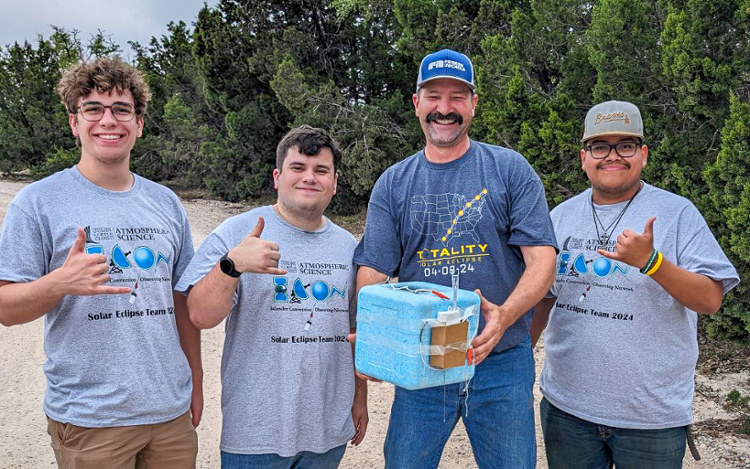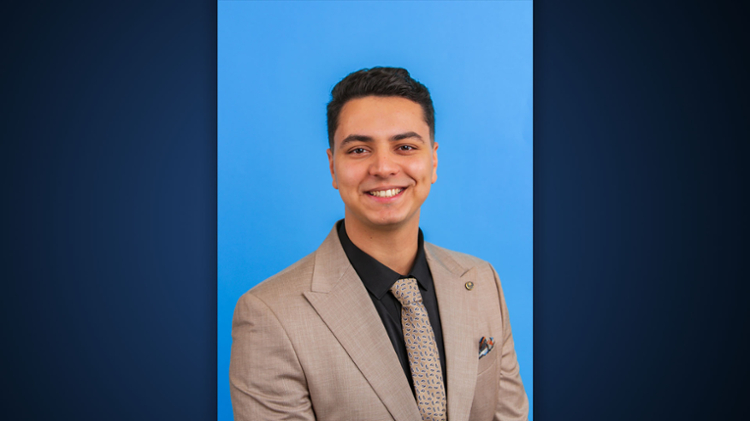TAMU-CC Marine Biology Graduate Student to be Awarded Prestigious NSF Grant for Shark Research
CORPUS CHRISTI, Texas — Katie Gheysen ’25, a marine biology master’s student at Texas A&M University-Corpus Christi, is celebrating a remarkable milestone — a prestigious National Science Foundation (NSF) Graduate Research Fellowship Program (GRFP) award. The five-year fellowship provides three years of financial support inclusive of an annual stipend of $37,000 and is intended to broaden the participation of the full spectrum of talents in STEM.
“When I first found out that I was being offered the fellowship, I was in utter disbelief,” Gheysen said “For my specific field to gain this recognition is an achievement for me as an early-career scientist and a graduate student.”
Gheysen is referring to the field of movement ecology, studying how local populations of juvenile bonnethead sharks, spinner sharks, and cownose rays interact with each other and their environments, analyzing their movements and behaviors to uncover the secret lives of these predators. For the Chicagoland-native, access to the sharks she is so passionate about started in a man-made environment.
“I was an avid watcher of Discovery Channel’s Shark Week and spent much of my free time growing up at the Shedd Aquarium in Chicago, where my favorite thing to do was to watch the sharks in the Wild Reef exhibit,” Gheysen said. “I paid attention to their behaviors and learned when the best time to spot them was. Later, in high school, I volunteered at the aquarium and got my basic open-water scuba certification. I did everything I could to be in the water and up close with marine life.”
As an Islander, Gheysen now finds herself surrounded by water and is spending much of this summer tagging sharks and rays in order to track their movement patterns throughout Aransas, Redfish, and Corpus Christi Bays.
“We hope that the data we gather will reveal whether bonnethead sharks, spinner sharks, and cownose rays use similar areas within the three bays and whether their movements change throughout the day or across seasons,” Gheysen explained. “We also want to see whether these three species exhibit niche partitioning, which allows different species in the same ecosystem to coexist by either using different habitats or being active at different times, thus lowering the amount of direct competition for resources between them.”
Gheysen’s work has the potential to have far-reaching impact on our understanding of these species and enhance management and conservation efforts, particularly since bonnethead sharks are considered endangered globally according to the International Union for Conservation of Nature Red List of Threatened Species, and both spinner shark and cownose ray populations are considered vulnerable.
“If we can identify key areas of juvenile habitat use within our local bays and estuaries, we can provide information to support their successful conservation and management,” she said. “Understanding when, where, how, and why individuals move will be used to identify the spatial scale of management to promote the continued health of local populations, all three of which take a relatively long time to grow and reach reproductive maturity.”
According to Gheysen’s advisor, Assistant Professor of Biology for Fisheries and Mariculture and Research Fellow at the Harte Research Institute for Gulf of Mexico Studies, Dr. Daniel Coffey, this is only the second time that a TAMU-CC graduate student is to receive an NSF Graduate Research Fellowship, the first being in 2016.
“This prestigious award is a testament to Katie’s dedication and passion for marine biology,” Coffey said. “It will have a significant impact on both her research and her academic career, and it is very gratifying to see her hard work pay off. I am very proud to see the exceptional quality and talent of our emerging marine biologists trained here at the Island University.”
Katie Gheysen will give a keynote presentation on her research on Thursday, July 11, at 2 p.m. in the Special Collections and Archives Commons Area on the second floor of the Bell Library. The talk is free and open to the public and includes light refreshments. Visit sharkweek.tamucc.edu for more information.

















